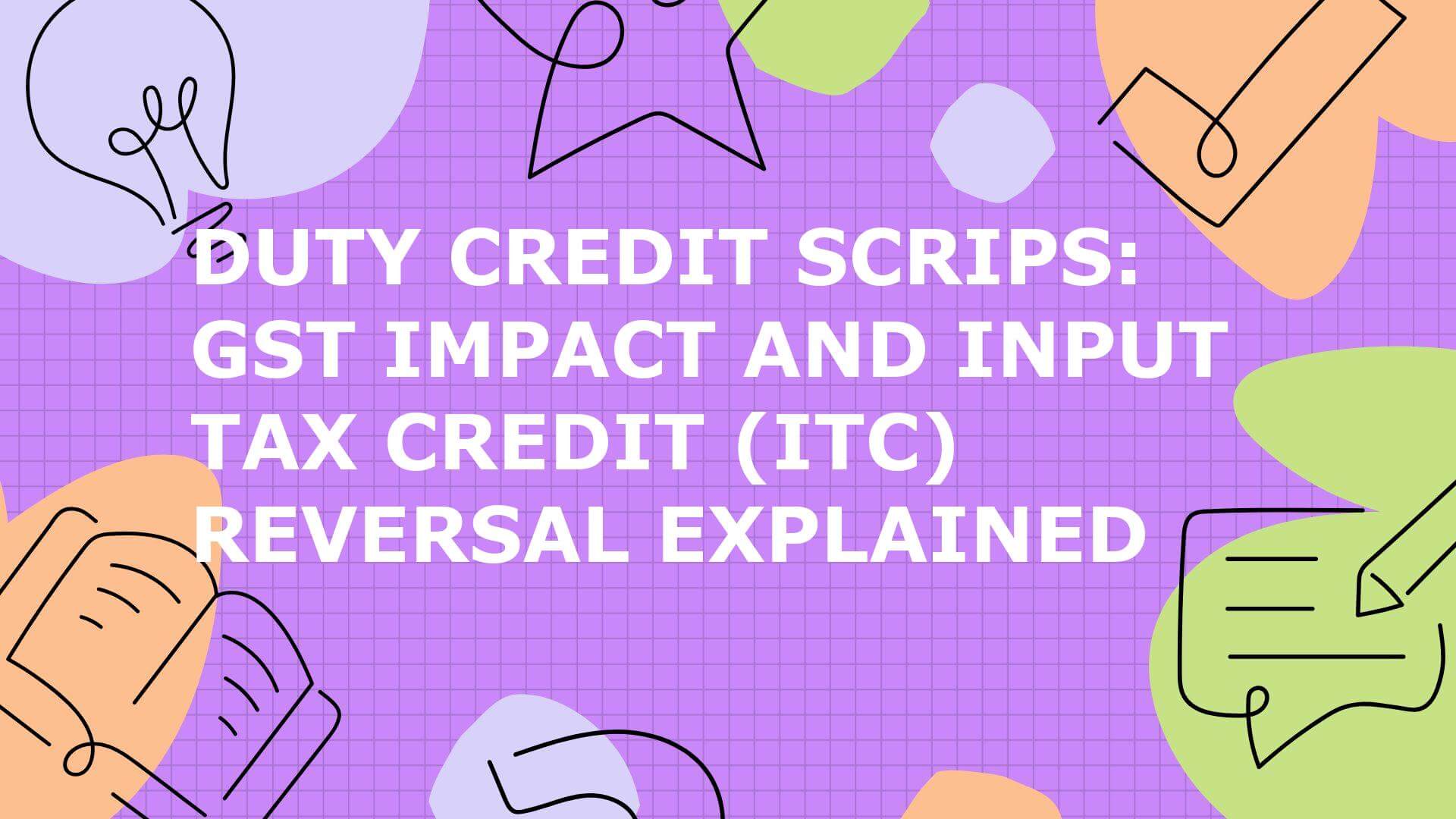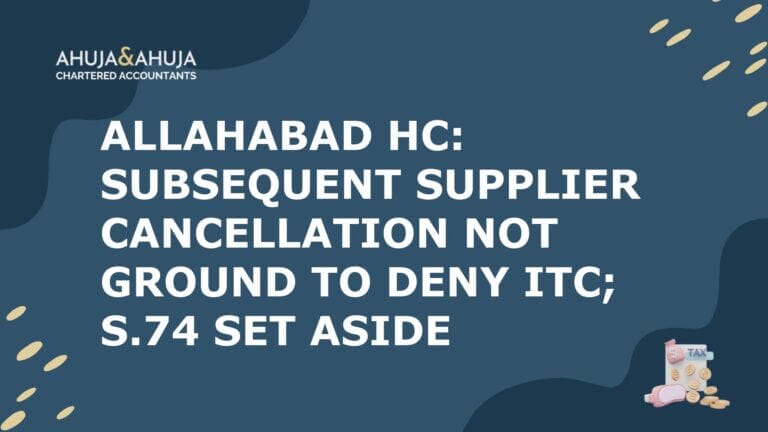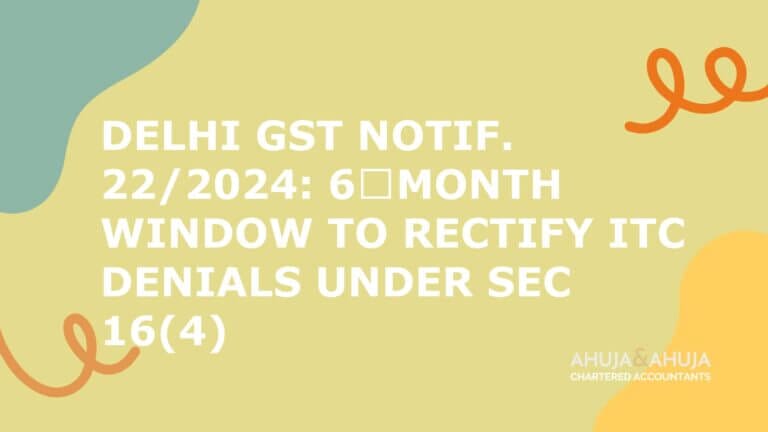Duty Credit Scrips: GST Impact and Input Tax Credit (ITC) Reversal Explained
Duty Credit Scrips (DCS) have long been a cornerstone of India’s export promotion strategy, rewarding exporters under flagship schemes like MEIS, SEIS, and RoDTEP. While these scrips offer tangible financial benefits, their treatment under GST—especially regarding Input Tax Credit (ITC) reversal—has been a source of confusion and compliance risk for exporters, CFOs, and tax professionals.
Recent years saw a flurry of departmental notices demanding ITC reversal on the sale or transfer of DCS, arguing that such transactions constituted exempt supplies. This led to industry-wide uncertainty, with many exporters erring on the side of caution and reversing ITC on common input services, sometimes unnecessarily.
A major turning point arrived with the CBIC’s 2022 amendment to Rule 43 of the CGST Rules. This clarification explicitly excludes the value of DCS from the aggregate value of exempt supplies for ITC reversal purposes. The result: exporters are no longer required to reverse ITC on account of DCS sales, bringing much-needed clarity and relief.
Key takeaways for exporters, CFOs, and tax professionals:
- DCS are exempt from GST since 13 October 2017 (Entry No. 122A, HSN 4907).
- No ITC reversal is required on the sale or transfer of DCS post-2022 clarification.
- Retrospective benefit: The amendment is widely interpreted as clarificatory and thus applies to prior periods as well.
- Refund opportunity: Exporters who previously reversed ITC on DCS sales may be eligible to reclaim credits or file for refunds.
- Compliance focus: Accurate reporting of exempt supplies and robust documentation remain essential to avoid audit risks and penalties. For expert assistance with GST returns and compliance, you may consider professional GST return filing services.
This article unpacks the legal framework, practical scenarios, and compliance strategies around DCS, GST, and ITC reversal—empowering you to navigate this evolving landscape with confidence.
2. Introduction to Duty Credit Scrips (DCS)
What are Duty Credit Scrips?
Duty Credit Scrips are government-issued incentives designed to boost India’s exports. Under the Foreign Trade Policy, exporters earn these scrips as a reward for their export performance. The most prominent schemes include:
- MEIS (Merchandise Exports from India Scheme)
- SEIS (Service Exports from India Scheme)
- RoDTEP (Remission of Duties and Taxes on Exported Products)
How do DCS work?
Exporters receive scrips based on the value of their eligible exports. These scrips can be used to pay various customs duties—such as Basic Customs Duty (BCD), safeguard duty, and anti-dumping duty—when importing goods. However, they cannot be used to pay GST on imports or domestic supplies.
Salient characteristics:
- Freely tradable: DCS can be sold or transferred in the open market if not used by the original exporter.
- Market-driven value: The price of DCS fluctuates based on demand and supply, often trading at a discount to their face value.
- No GST offset: DCS are strictly for customs duty payments, not for GST liabilities.
This flexibility makes DCS a valuable liquidity tool for exporters, allowing them to monetize unused scrips or reduce import costs. For detailed assistance with export incentive schemes and related GST matters, our GST consultancy services provide expert guidance.
3. GST Classification and Treatment of DCS
Legal classification
Under GST, DCS are classified as “goods.” Initially, their sale or transfer attracted GST, creating a compliance burden for exporters.
Chronology of GST applicability:
- Before 13 October 2017: Sale or transfer of DCS was a taxable supply, attracting GST at the applicable rate.
- From 13 October 2017 onwards: DCS were exempted from GST via Entry No. 122A (HSN 4907), following a government notification.
Scheme-wise GST implications:
- MEIS, SEIS, RoDTEP: All three schemes’ scrips are treated similarly for GST purposes. Sale or transfer of these scrips is an exempt supply post-13 October 2017.
Reporting exempt supplies in GST returns:
- GSTR-1: Exempt supplies, including DCS sales, should be reported in Table 8.
- GSTR-3B: Disclose the value of exempt supplies in Table 3.1(c).
- Documentation: Maintain clear records of DCS transactions, including invoices, agreements, and supporting paperwork.
Key point:
While DCS sales are exempt from GST, they must still be disclosed in GST returns to ensure transparency and compliance.
For assistance on GST audits and compliance, see our GST audit services.
4. Differentiating Between Use and Transfer of DCS: GST & ITC Reversal Implications
A common pain point for exporters and tax professionals is understanding how the use versus transfer of Duty Credit Scrips (DCS) impacts GST compliance and Input Tax Credit (ITC) reversal. Let’s break down both scenarios and clarify the compliance steps for each.
4.1 “Use” of DCS (for Own Import Duties)
What happens when you use DCS for your own imports?
- No supply under GST: When an exporter uses DCS to pay customs duties on their own imports, there is no “supply” as defined under GST law. The scrip is simply being redeemed, not sold or transferred.
- No ITC reversal required: Since there is no exempt supply involved, the question of ITC reversal does not arise.
- Compliance steps:
- Internally track the utilization of DCS for customs duty payments.
- Maintain records of scrip application and corresponding import bills of entry.
- No GST invoice or return disclosure is required for such use.
Key takeaway:
If you’re using DCS for your own imports, you do not need to worry about ITC reversal or GST reporting for this transaction.
4.2 “Transfer” or “Sale” of DCS
What if you sell or transfer DCS to another party?
- Exempt supply under GST: The sale or transfer of DCS is treated as an exempt supply post-13 October 2017 (Entry No. 122A, HSN 4907).
- Trigger for ITC reversal (pre-2022):
- Before the 2022 CBIC clarification, such exempt supply triggered the need for proportionate ITC reversal under Rule 42/43, since common inputs and input services were considered to be used for both taxable and exempt supplies.
- Stepwise compliance and documentation:
- Issue a GST-compliant invoice for the transfer of DCS, clearly marking it as an exempt supply.
- Disclose the transaction in GSTR-1 (Table 8) and GSTR-3B (Table 3.1(c)).
- Maintain agreements, correspondence, and payment records for audit trail.
- Calculate and reverse ITC (if applicable for periods before the 2022 clarification), following Rule 42/43 methodology.
- Post-2022: No ITC reversal is required for DCS sales, but proper documentation and return disclosures remain essential.
Key compliance tip:
Even though DCS sales are exempt, always ensure transparent reporting and robust documentation to defend your position during audits. For support in GST litigation and disputes including ITC reversal cases, our GST litigation services can help.
4.3 Practical Scenarios
| Scenario | GST Implication | ITC Reversal |
|---|---|---|
| DCS used for own imports | Not a supply; no GST or ITC reversal | Not required |
| DCS transferred/sold to others | Exempt supply; report in GST returns | Not required post-2022 |
5. ITC Reversal Framework under GST Law
Understanding when and how to reverse ITC is crucial for exporters dealing with DCS, especially in light of evolving regulations.
5.1 Legal Basis
- Section 17(2) of the CGST Act:
Requires reversal of ITC when inputs or input services are used for both taxable (including zero-rated) and exempt supplies. - Section 17(6) and Rules 42/43:
- Rule 42: Governs reversal for inputs and input services.
- Rule 43: Governs reversal for capital goods.
5.2 When Are Exporters Required to Reverse ITC?
- Pre-2022 (before CBIC clarification):
- If DCS were sold/transferred, the value of such exempt supply was included in the aggregate exempt turnover, triggering proportionate ITC reversal.
- Common input services (e.g., office rent, audit fees, telecom) were often considered for reversal.
- Post-2022 (after CBIC clarification):
- The value of DCS is excluded from the aggregate exempt turnover.
- No ITC reversal is required on account of DCS sales.
5.3 Calculation of Proportionate ITC Reversal (Pre-2022)
Stepwise approach:
- Identify common credits:
- Segregate ITC attributable exclusively to taxable/zero-rated supplies and exclusively to exempt supplies.
- The remaining is “common credit.”
- Calculate proportionate reversal:
- Formula:
Reversal Amount = Common Credit × (Exempt Turnover ÷ Total Turnover) - For capital goods, use Rule 43’s prescribed method.
- Example:
- If total common input service ITC is ?1,00,000, exempt turnover (including DCS sales) is ?10,00,000, and total turnover is ?1,00,00,000:
Reversal = ?1,00,000 × (?10,00,000 ÷ ?1,00,00,000) = ?10,000
Note:
After the 2022 amendment, DCS value is not to be included in exempt turnover for this calculation.
For professional help on accurate ITC calculation and reversal compliance, consult our GST refund services.
Key takeaways for exporters and tax professionals:
- Use of DCS for own imports: No ITC reversal or GST reporting required.
- Transfer/sale of DCS: Exempt supply; ITC reversal not required post-2022, but maintain proper disclosures and documentation.
- For past periods: If ITC was reversed on DCS sales, consider reclaiming credits or filing for refunds.
6. Industry Practice & Departmental Approaches Pre-2022
Before the CBIC’s 2022 clarification, the GST treatment of Duty Credit Scrips (DCS) was a grey area, leading to divergent practices and frequent disputes between exporters and the tax department.
6.1 Show Cause Notices (SCNs) and Demands for ITC Reversal
Many exporters who transferred or sold DCS received Show Cause Notices (SCNs) from GST authorities. The department’s argument was straightforward: since the sale of DCS was an exempt supply, any common input services or capital goods used in the business (even if primarily for exports) triggered the need for proportionate ITC reversal under Rule 42/43. This led to demands for reversal of ITC on a wide range of input services, sometimes stretching logic to include almost all overheads.
6.2 Exporter Counter-Arguments: DCS as Policy-Driven Incentives
Exporters, on the other hand, consistently argued that DCS are post-export, policy-driven incentives—not a direct output of any input or input service. The scrips are granted by the government as a reward for export performance, not as a result of any specific supply chain activity. Therefore, they contended, the sale of DCS should not be treated as an exempt supply that attracts ITC reversal, especially since the underlying export activity is zero-rated and fully eligible for ITC.
6.3 Typical Attribution Errors—Over-Zealous Common Input Allocation
In practice, some businesses, out of an abundance of caution or under departmental pressure, began reversing ITC on a broad set of input services—such as office rent, audit fees, telecom expenses, and even CHA charges—on the assumption that these were “common” to both exports and DCS sales. This often resulted in excessive and unnecessary ITC reversals, impacting working capital and compliance costs.
6.4 Examples and Case Studies
| Case Study | Description | GST Implication |
|---|---|---|
| 1 | DCS utilized internally for payment of customs duties | No supply; ITC reversal not applicable |
| 2 | DCS transferred to third party | Exempt supply; ITC reversal demanded by department |
Illustration:
A textile exporter receives DCS worth ?10 lakh. If used for their own imports, there is no GST event and no ITC reversal. If sold to another exporter, the department (pre-2022) would demand reversal of ITC on common input services, even though the DCS was earned for past exports.
If your business is located in Northern India, you might find it helpful to connect with our experienced chartered accountants in Chandigarh or Ghaziabad for region-specific GST advisory and compliance assistance.
7. Inputs & Services Sometimes Considered for Reversal
7.1 Types of Input Services Often Considered
The following input services were commonly flagged for ITC reversal in connection with DCS sales:
- Office rent
- Telecom and internet expenses
- Audit and professional fees
- CHA (Customs House Agent) charges for scrip registration or transfer
These were treated as “common” inputs, even though their direct nexus with the sale of DCS was tenuous at best.
7.2 Is Such Attribution Still Necessary Post-2022?
No. The 2022 amendment to Rule 43, along with the CBIC’s explicit clarification, has put this debate to rest. The value of DCS sales is now excluded from the aggregate value of exempt supplies for ITC reversal purposes. This means:
- Exporters no longer need to reverse ITC on common input services or capital goods merely because they have sold or transferred DCS.
- For open cases or ongoing disputes, businesses should revisit their ITC computations and prepare to defend their position using the latest clarification.
Transitional actions for open cases:
- Compile all relevant documentation (invoices, agreements, correspondence).
- Prepare a reconciliation of ITC reversals made in prior periods.
- Draft representations citing the 2022 amendment and CBIC clarification to contest or close pending demands.
For smooth handling of audits and disputed ITC reversals, you can rely on professional GST audit services.
8. CBIC’s 2022 Amendment: Paradigm Shift
8.1 Rule 43 Amendment—Clause (d), Explanation 1
The game-changer for exporters came with Notification No. 14/2022, which amended Rule 43 of the CGST Rules. The key change:
Clause (d), Explanation 1: The value of supply of Duty Credit Scrips (DCS) shall be excluded from the aggregate value of exempt supplies for the purpose of ITC reversal.
8.2 GST Treatment of DCS Sales Now
- No ITC reversal required for the exempt sale or transfer of DCS, regardless of the scheme (MEIS, SEIS, RoDTEP).
- This applies to all exporters, whether they use or transfer DCS.
8.3 Documentation & Record-Keeping
To support your compliant position:
- Maintain copies of the relevant notifications (especially Notification No. 14/2022).
- Keep detailed workings of ITC calculations, showing exclusion of DCS value from exempt turnover.
- Retain legal opinions or professional advice obtained on the subject.
- Document all correspondence with the department, especially in case of ongoing audits or disputes.
Pro tip:
A well-organised compliance file can make all the difference during audits or appeals.
For expert consultation on corporate tax matters related to GST and export incentives, you can also explore our corporate tax services.
Disclaimer
The materials provided herein are solely for educational and informational purposes. No attorney/professional-client relationship is created when you access or use the site or the materials. The information presented on this site does not constitute legal or professional advice and should not be relied upon for such purposes or used as a substitute for professional or legal advice.







